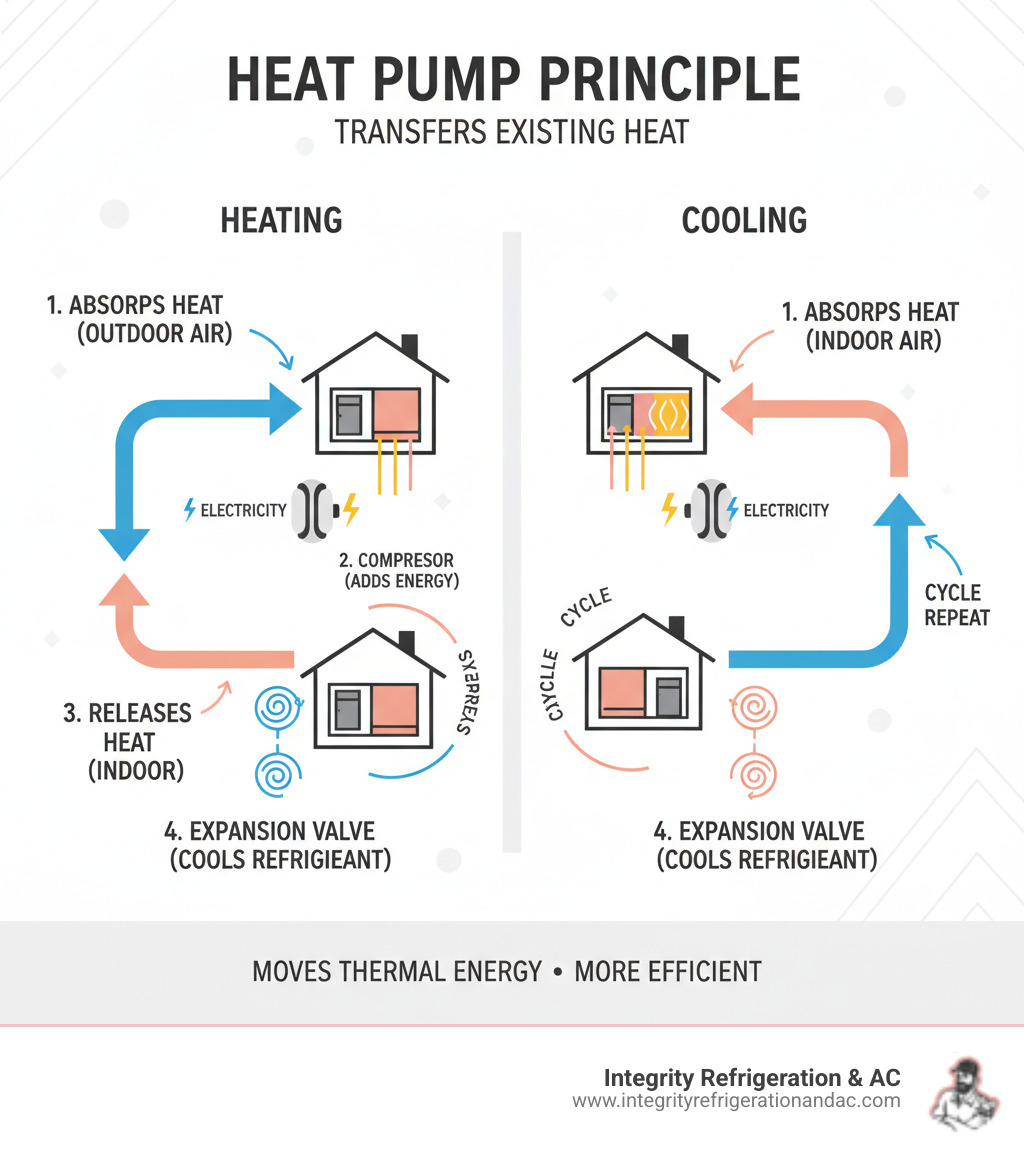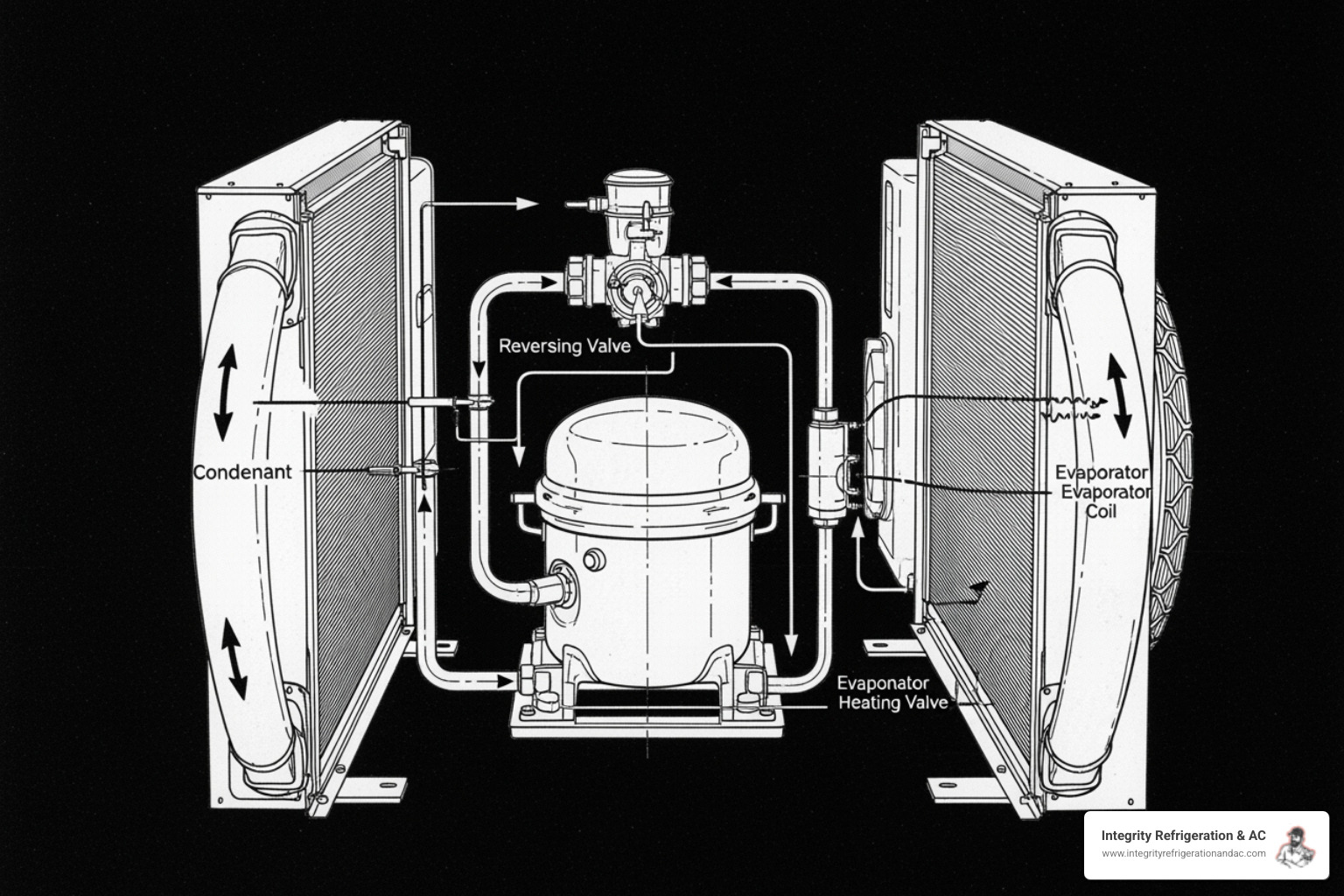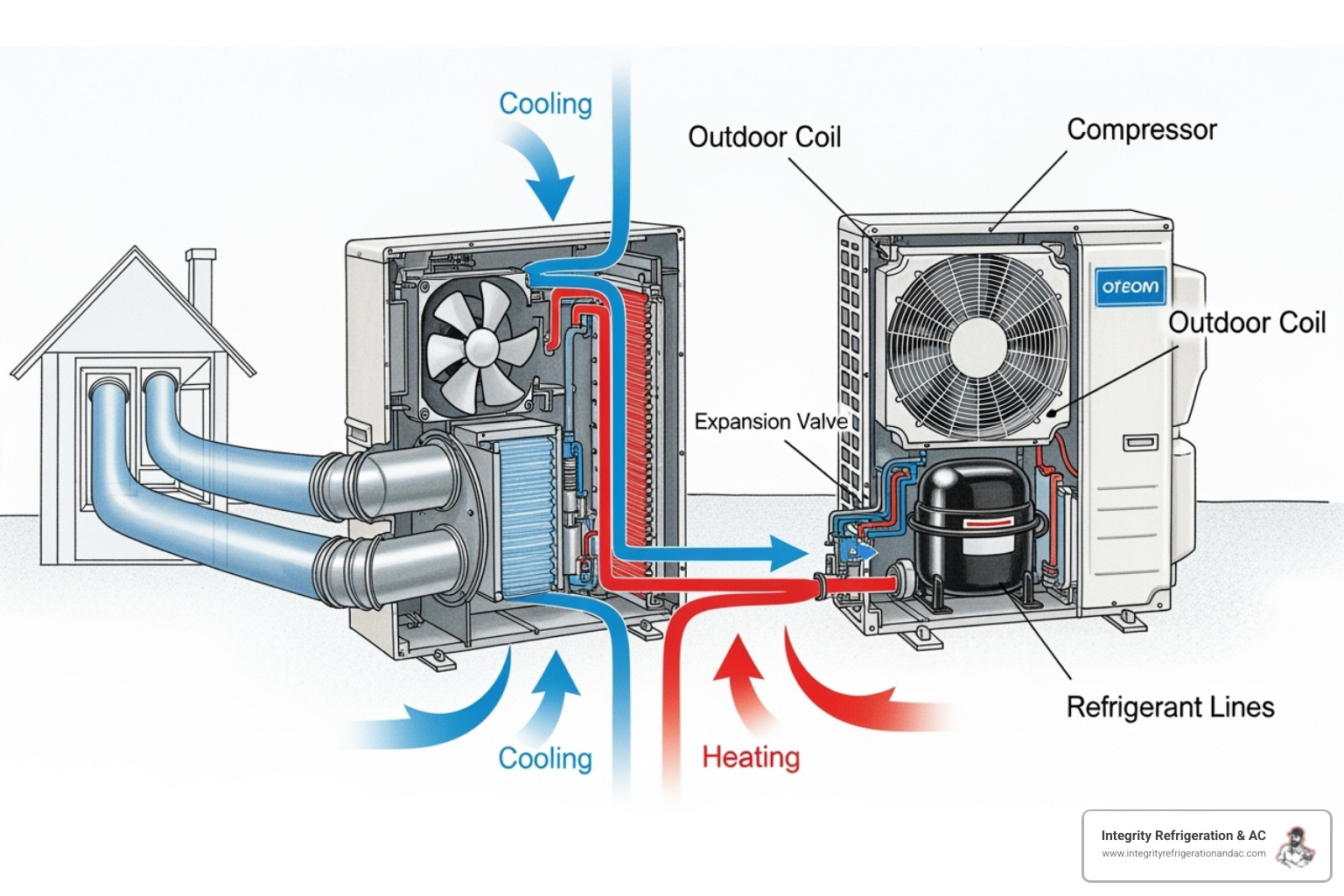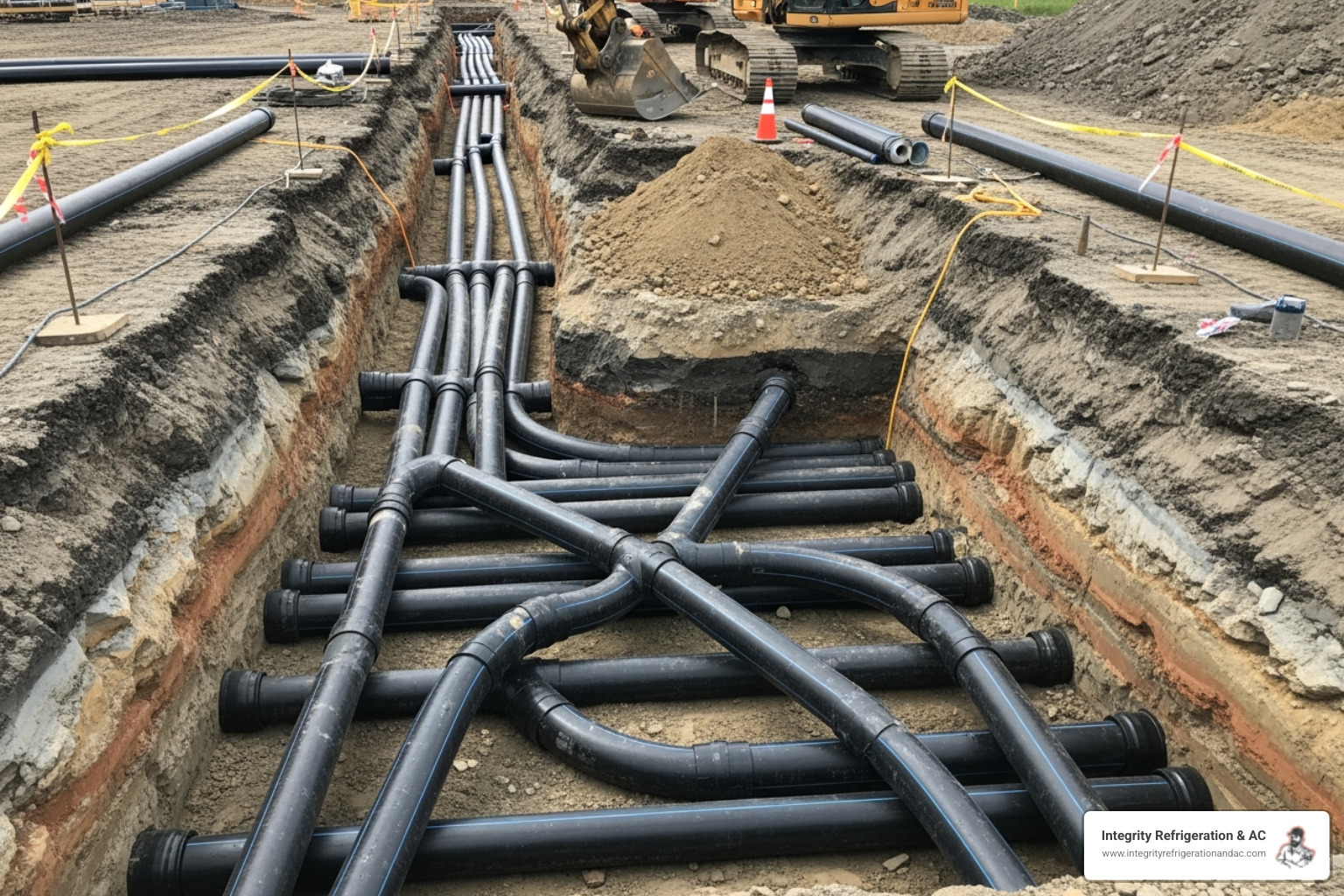Unlocking the Mystery: How Heat Pumps Provide Heating and Cooling


Unlocking the Mystery: How Heat Pumps Provide Heating and Cooling

The All-in-One Climate Solution for Florida Homes
If you're a homeowner in Polk County dealing with rising energy bills or an aging HVAC system, a heat pump could be your key to serious savings and year-round comfort. A heat pump is a two-in-one system that cools your home in Florida's sweltering summers and provides efficient heating during those surprisingly chilly winter mornings.
So, how do heat pumps work? Instead of burning fuel to create heat, a heat pump cleverly moves heat from one place to another. In summer, it pulls heat from inside your home and transfers it outdoors. In winter, it reverses the process, extracting heat from the outside air and moving it indoors. This heat transfer method is far more energy-efficient than traditional systems. The U.S. Department of Energy notes that heat pumps can cut electricity use for heating by about 50% compared to electric furnaces.
For Florida homeowners, this efficiency means lower monthly bills and a smaller carbon footprint. Heat pumps are perfectly suited to our mild winters, easily extracting enough heat from the outdoor air to keep you warm.
I'm Billy Gregus, owner of Integrity Refrigeration & A/C. I've spent years helping homeowners understand this technology to make smart decisions for their homes. My goal is to show you why a heat pump is one of the best investments you can make for your Florida home.

The Science Behind the System: How Do Heat Pumps Work?
Heat pumps don't create heat; they move it. Think of your refrigerator: it pulls heat from inside and releases it into your kitchen. A heat pump does the same on a larger scale, with the ability to reverse the process for heating.
This is where understanding how do heat pumps work gets interesting. The system uses a refrigeration cycle, a continuous loop where a substance called refrigerant absorbs and releases heat. As the refrigerant changes between liquid and gas, it moves thermal energy. When it evaporates (liquid to gas), it absorbs heat. When it condenses (gas to liquid), it releases that heat. By controlling the refrigerant's pressure, the system can move heat in either direction.
This process is far more efficient than burning fuel or using electric coils, as it takes less energy to move heat than to create it. For a deeper dive, How Does a Heat Pump Work? from ENERGY STAR is a great resource.
The Main Components
To understand how do heat pumps work, you need to know the key parts that make this heat transfer happen.

- The compressor is the heart of the system. It pressurizes the refrigerant gas, raising its temperature so it's ready to release heat.
- The condenser coil and evaporator coil work in tandem, with one inside and one outside. Their roles switch depending on whether you're heating or cooling. One coil releases heat while the other absorbs it.
- The reversing valve is the component that allows the system to switch between heating and cooling modes by changing the direction of the refrigerant flow.
- The expansion valve lowers the refrigerant's pressure and temperature, preparing it to absorb heat again and repeat the cycle.
When these parts work together, you get reliable comfort. If one fails, you might notice airflow issues or poor performance. Our guide on Solving Heat Pump Airflow Problems can help you troubleshoot.
A Tale of Two Seasons: Heat Pump Operation Year-Round
A heat pump's most remarkable feature is its ability to provide both heating and cooling. It handles Florida's sweltering summers and chilly winter mornings with a single, efficient unit. The secret is the reversing valve, which allows the system to switch gears and adapt to the weather. Understanding how do heat pumps work in both seasons reveals just how ingenious this technology is.

How a Heat Pump Works in the Summer: The Cooling Cycle
In the summer, your heat pump functions just like a standard air conditioner. The indoor coil absorbs heat from your home's air, and the refrigerant carries it to the outdoor unit, where it's released. This continuous cycle pulls heat out of your house, keeping it cool. As a bonus for Florida homeowners, this process also dehumidifies the air. As warm, humid air passes over the cold indoor coil, moisture condenses and is drained away, making your home feel much more comfortable. Learn more in our article on the Cooling Capabilities of Heat Pumps.
How a Heat Pump Works in the Winter: The Heating Cycle
When winter arrives, the reversing valve switches the system's flow. Now, the heat pump extracts thermal energy from the cold outdoor air and brings it inside. It might seem magical, but there's heat in the air even on cold days. The outdoor coil absorbs this heat, and the refrigerant is compressed to a high temperature. This hot refrigerant then flows to the indoor coil, releasing warmth into your home. It's a continuous loop that provides efficient heat without burning any fuel.
Occasionally, you might see your unit enter a defrost cycle. If frost builds up on the outdoor coil in cold, damp weather, the system briefly reverses to melt it. This is normal, but if you see excessive ice, it's time for a check-up. Our guide on When Heat Pump Freezes Up Solutions has more information.
Modern heat pumps are highly effective in cold weather, easily handling Florida's mild winters. The old myth that they don't work in the cold is simply outdated. For homeowners in Polk County, this dual functionality means year-round comfort from one efficient system.
Understanding Heat Pump Types and Efficiency
Not all heat pumps are the same. They differ in where they source and reject heat, which impacts installation and efficiency. The main benefit is always energy savings—heat pumps can produce two to three times more thermal energy than the electricity they consume, saving you money and reducing your carbon footprint.

Air-Source vs. Ground-Source Heat Pumps
Air-source heat pumps are the most common type in Florida. They transfer heat between your indoor air and the outdoor air. They are straightforward to install, work with existing ductwork (or come in ductless versions), and are perfectly suited for our moderate climate.
Ground-source (geothermal) heat pumps exchange heat with the earth via buried pipes. The ground's stable temperature makes these systems extremely efficient. However, the required excavation makes installation more complex and costly. For most Florida homeowners, air-source heat pumps offer the best balance of performance, value, and impressive efficiency.
Decoding Efficiency Ratings: SEER, HSPF, and COP
When homeowners ask how do heat pumps work to save money, the answer lies in their efficiency ratings. Understanding these acronyms helps you predict your utility savings.
- SEER (Seasonal Energy Efficiency Ratio): Measures cooling efficiency over a season. A higher SEER means lower A/C costs, which is crucial for Florida summers. Modern units range from 14 to over 40.
- HSPF (Heating Seasonal Performance Factor): Measures heating efficiency. A higher HSPF means you'll use less electricity to stay warm on chilly mornings.
- COP (Coefficient of Performance): Shows how much heat is produced per unit of electricity used. A COP of 4 means the heat pump is 400% efficient, delivering four units of heat for every one unit of electricity consumed.
- EER (Energy Efficiency Ratio): Measures cooling efficiency at a specific, fixed temperature. Like SEER, higher is better.
Higher ratings mean lower energy bills. Choosing an ENERGY STAR certified heat pump guarantees it meets strict efficiency guidelines. At Integrity Refrigeration & AC, we help you find the right balance of efficiency and affordability, with flexible financing to make your upgrade manageable.
Practical Considerations for Homeowners
Investing in a heat pump is a smart move, but getting the most out of it requires understanding its care and operation. Here's what you need to know to make your heat pump work best for your Florida home.
Dual-Fuel Systems and Extreme Cold
What happens when it gets really cold? Modern heat pumps are highly effective even in cold weather, far colder than we see in Florida. As temperatures drop, a heat pump's output decreases. Below a certain temperature, called the balance point, it may need help. This is where supplemental heat (or auxiliary heat) comes in. Most heat pumps have built-in electric resistance strips that provide an extra boost of warmth on the coldest mornings. While less efficient than the heat pump itself, they ensure you always stay comfortable.
In colder climates, some homeowners use a dual-fuel system (a heat pump paired with a furnace), but this is rarely necessary for Florida's mild winters. Our heat pumps handle the weather just fine.
Installation and Maintenance Essentials
Proper installation and regular maintenance are crucial for your heat pump's performance and longevity. A poorly installed or neglected unit will be inefficient and prone to failure.
Installation: Professional installation is non-negotiable. Key factors include:
- Proper Sizing: The unit must be correctly sized for your home's specific needs. An oversized or undersized unit will waste energy and wear out faster.
- Unit Placement: The outdoor unit needs at least two feet of clearance for airflow and should be placed away from living spaces to minimize noise.
- Ductwork Inspection: For ducted systems, we ensure your ducts are sealed and insulated to prevent energy loss.
A quality Heat Pump Installation Winter Haven FL is the foundation for years of reliable comfort.
Maintenance: Consistent care keeps your system running efficiently.
- Change Air Filters: Replace your filter every 1-3 months to ensure proper airflow.
- Clear the Outdoor Unit: Keep leaves, grass, and debris away from the outdoor unit.
- Schedule Professional Tune-Ups: Annual Heat Pump Maintenance Winter Haven FL is essential. A technician will clean coils, check refrigerant levels, and inspect all components to prevent major repairs and maintain efficiency.
If you notice any issues, our guide on Signs You Need a Heat Pump Repair can help you decide when to call for service.
Frequently Asked Questions About How Heat Pumps Work
Homeowners in Polk County often have the same questions about heat pumps. Here are the answers to the most common ones.
At what temperature does a heat pump become less effective?
While older models struggled below 25°F, modern heat pumps are highly efficient in much colder weather. For Florida's mild winters, they work beautifully. On the rare, very cold mornings, a built-in supplemental heat system (usually electric resistance strips) provides an automatic boost to ensure your home stays warm. The old myth that heat pumps don't work in the cold is based on outdated technology.
Does a heat pump bring outside air into the house?
No, a heat pump does not bring outside air into your home. It recirculates the air already inside your house. The system uses refrigerant to transfer heat between the indoor and outdoor units, but the air from inside and outside never mixes. Its job is temperature control, not ventilation. Separate ventilation systems can be added if you want to introduce fresh air.
How does a heat pump save energy compared to a furnace or AC?
Heat pumps save energy because they move heat rather than generate it. A furnace must burn fuel to create heat, a process that is inherently less than 100% efficient. A heat pump simply transfers existing heat, allowing it to achieve efficiency ratings of 300-400% (a COP of 3 to 4). This means for every dollar of electricity you use, you get three to four dollars' worth of heating or cooling. This high efficiency leads to lower electricity consumption, smaller utility bills, and a reduced carbon footprint.
Conclusion: Accept Efficient Year-Round Comfort
Now that you understand how do heat pumps work, you can see why they are such a smart choice. By moving heat instead of creating it, a single system provides seamless cooling in the summer and efficient heating in the winter. It's a remarkable technology that simplifies your home's climate control.
For Florida homeowners, heat pumps are an ideal fit. They deliver powerful cooling for our long summers and efficient warmth for our mild winters, often using significantly less electricity than traditional systems. This means real savings on your monthly bills and the convenience of a single, all-in-one unit.
At Integrity Refrigeration & A/C, we've helped families across Winter Haven, Lakeland, Auburndale, and Davenport enjoy the benefits of heat pumps. We believe everyone deserves a comfortable home, which is why we offer flexible financing options to make upgrading easy and affordable.
If you're tired of high energy bills or dealing with an old HVAC system, we're here to help. We provide honest advice to help you decide if a heat pump is right for you. Ready to learn more? Learn more about our heat pump services in Winter Haven, FL and let's create the comfortable, efficient home you deserve.


